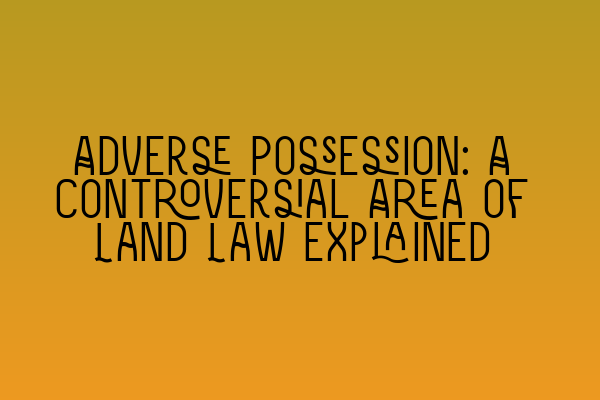Adverse Possession: A Controversial Area of Land Law Explained
Land law is a vast and complex field, often marked by controversial issues that challenge legal professionals and property owners alike. One such contentious topic is adverse possession, which involves the acquisition of someone else’s land through continuous possession for a specified period of time. In this blog post, we will delve into the intricacies of adverse possession, explore its legal basis, and analyze its implications in the realm of property law.
Understanding Adverse Possession
Adverse possession, also known as squatter’s rights, is a legal doctrine that allows a person to gain ownership of land without the permission or consent of the current owner. The concept may seem puzzling to some, as it contradicts the fundamental principle of property law that requires the transfer of ownership to be consensual and voluntary.
The rationale behind adverse possession is rooted in ensuring the efficient use and enjoyment of land. By rewarding individuals who actively occupy and care for neglected or abandoned properties, adverse possession aims to prevent dormant or unused land from hindering economic development and societal progress.
Requirements for Adverse Possession
For adverse possession to be established, certain conditions must be met. These requirements may vary slightly depending on the jurisdiction, but they generally include the following:
- Actual Possession: The claimant must demonstrate actual physical possession of the land. Mere intention or occasional use of the property is insufficient to establish adverse possession.
- Open and Notorious: The possession must be conducted openly and visibly, without attempting to hide or conceal it from the true owner.
- Exclusive Possession: The claimant’s possession must be exclusive, meaning they have exclusive control over the property without interference from the true owner or others.
- Hostile Possession: The possession must be hostile, in the sense that the claimant occupies the land without the true owner’s permission or legal right.
- Continuous Possession: The possession must be continuous and uninterrupted for a specific period of time, usually ranging from 10 to 20 years.
Meeting these requirements can be challenging, as each element must be satisfied to establish a successful claim for adverse possession. However, if the claimant can provide sufficient evidence and meet the necessary criteria, they may be able to claim ownership of the property.
The Controversy Surrounding Adverse Possession
Adverse possession has long been a topic of debate and controversy among legal scholars and practitioners. Critics argue that the doctrine rewards trespassers and allows individuals to unjustly take possession of someone else’s property. They claim that adverse possession undermines the fundamental principles of property rights and ownership, as well as the notion of voluntary transfers.
On the other hand, proponents of adverse possession claim that it serves a vital purpose in preventing land from lying vacant or unused. They argue that allowing squatters to gain ownership of abandoned properties encourages landowners to take better care of their land, as neglect may result in the loss of ownership.
Implications for Property Owners
For property owners, the concept of adverse possession can be a cause for concern. It highlights the importance of vigilance and regular inspection of their land to prevent the encroachment of others. Failing to take action against a trespasser who satisfies the requirements for adverse possession may result in the loss of their property rights.
To safeguard against adverse possession claims, property owners should proactively monitor and maintain their land, addressing any encroachments or unauthorized occupation immediately. Seeking legal advice and understanding the intricacies of adverse possession can also help property owners protect their rights effectively.
Conclusion
Adverse possession is undoubtedly a controversial area of land law, raising complex legal and ethical questions. While it aims to promote efficient land use and prevent the abandonment of properties, it also challenges the fundamental principles of property rights and voluntary transfers. Whether one agrees or disagrees with the concept, adverse possession remains an intriguing aspect of land law that requires careful consideration and understanding.
If you enjoyed this article on adverse possession, you may also find the following related articles informative:
- Interactive SQE Mock Tests for Contract Law: Test Your Knowledge
- Join Our SQE Contract Law Webinars: Expert Insights and Guidance
- Contract Law Reforms: An Analysis of Recent Changes
- Parties in a Contract: Rights and Responsibilities
- The Importance of Ethics in Contract Law: A Comprehensive Guide
At SQE Property Law & Land Law, we strive to provide comprehensive insights into various aspects of property law. To stay up to date with the latest legal developments and expert guidance, be sure to subscribe to our newsletter and follow our blog.
